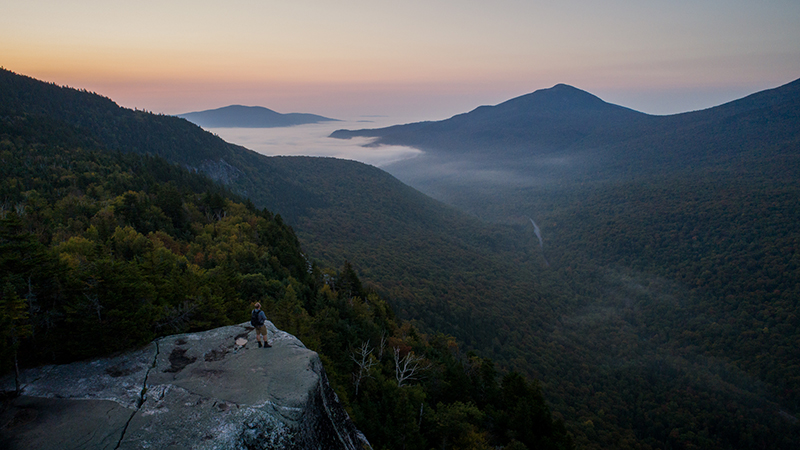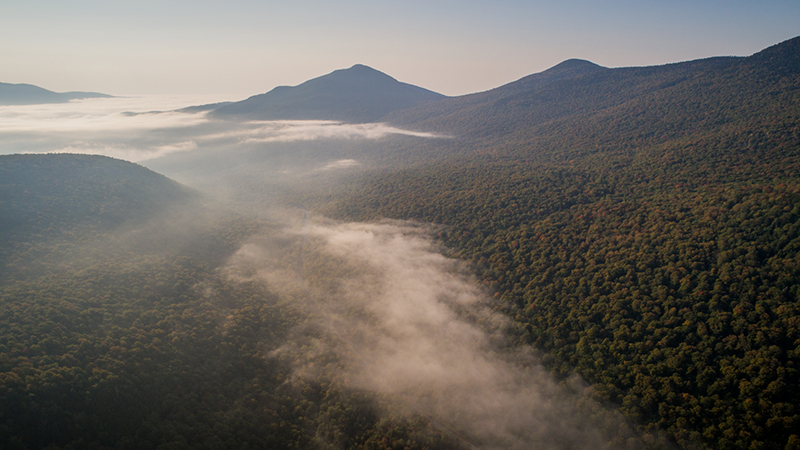The Maine Mountain Collaborative (MMC), founded in 2014, is a Regional Conservation Partnership (RCP) with a mission to accelerate land conservation in the Maine Appalachian Mountain Corridor. Highstead recently sat down with Bryan Wentzell, executive director of MMC, to learn more about how the collaborative is achieving this goal through its innovative transaction fund.

The MMC’s Transaction Fund, established in 2017, aimed to incentivize landowners to donate some of their land’s value while receiving funding for the development rights of their forestland. Through a $100,000 grant from the Jessie B. Cox Charitable Trust’s RCP Land and Easement Donation Program and an anonymous donor’s additional funds, the transaction fund awarded small grants ($15,000) to land conservation partners to cover transaction costs such as surveys, appraisals, and legal fees when the landowner donated at least 50% of the property’s value.
Since then, the transaction fund has grown and its objectives have shifted. “The original transaction fund was a great program, but it wasn’t enough of an incentive,” Wentzell says. “MMC found that the real value of the transaction fund was giving land trusts that initial money to get projects off the ground.”
What’s most effective about the original transaction fund, he says, is that it’s an accessible, “early-in” type of funding that allows land trusts to pay for upfront costs like surveys and appraisals that push the project forward, without requiring a contract or option with the seller. This better prepares applicants to pursue further grants or public funding, and removes barriers that often slow land conservation.
“If you’re a land trust and you know there’s a pool of money that you can get $15-$75K from pretty quickly, that’s super helpful for them,” he says. “It’s not a long process or a tough application.” MMC partners can also apply for grants from a second pool of funding with more requirements, but larger potential funding.
In the spirit of removing barriers, MMC purposefully designed the transaction fund application process to be as accessible as possible. “I’ve tried to do philanthropy in the way that I’d want it to be done if I was the one asking for it,” Wentzell says. “You have to put yourself in the applicant’s shoes, rather than the foundation’s shoes.”
For MMC, this means monthly grant team meetings so applicants can be approved for funding in a matter of weeks after applying, rather than months. The grant committee is made up of conservation experts in the area, which also speeds up the process. Being familiar with a lot of the grantees who are working in the 5-million-acre region, the team can look at a project and quickly tell if it makes sense. “The philanthropy is getting pushed out to the practitioners, so decisions are being made more on the ground rather than by people a few steps back,” he says.
Streamlining application requirements relates to what Wentzell calls “Trust-Based Philanthropy.” “We don’t have to make it more complicated than it needs to be,” says Wentzell. “We have these amazing conservation professionals, and we need to trust them to do their jobs.” He adds, “We’re greatly appreciative of the funders who have supported the program, and I hear that appreciation from the groups who utilize these grants.”

The transaction fund wouldn’t be possible without funders, however, and when asked how MMC can continue getting grants for the fund, Wentzell pointed out two key factors. The first is the transaction fund’s inherent appeal to foundations that want to have as much “bang for their buck” as possible. In this region, the typical land acquisition cost for larger projects could be tens of millions of dollars; with the transaction fund, funders can leverage dozens of projects for a relatively small cost ($100,000 – $250,000). The transaction fund allows them to spread their impact more widely.
The second factor in gaining funders is that MMC has established relationships with foundations. Foundations can see that the transaction fund is an effective program, with an impressive track record: In just six years, the fund has helped conserve 167,000 acres of land through the distribution of $522,000 in small grants.
Money attracts more money, and often projects that have received a transaction fund grant from MMC end up receiving larger grants further down the line from other funders. Wentzell stresses that while MMC may help facilitate some of these relationships, it’s really the direct relationships between projects and these funders that make the difference. “I want the collaborative members to directly have the relationships and communications with these funders,” he says. “There’s no need for me to get in the middle of that.”
Additionally, MMC’s work has inspired other RCPs in the region to start their own transaction funds. The takeaway message that Wentzell has for these RCPs and any others is this: “It’s really important for an RCP, especially for someone who is in the coordinator or leadership role, to ask themselves: ‘Where does the RCP add value to its members and our collective work?’ It can’t just exist for its own sake. I think the transaction fund is a tangible example of a way RCPs can add value.”